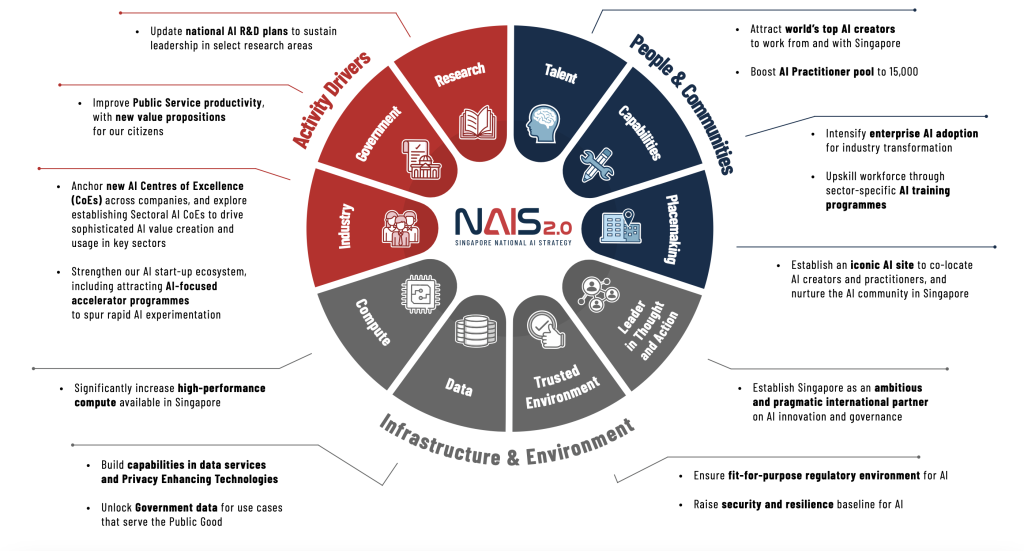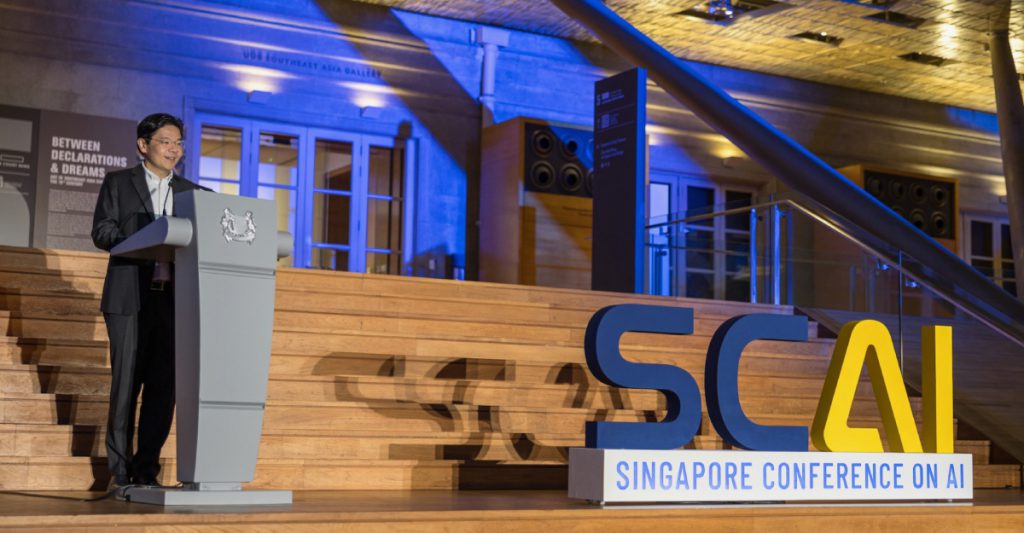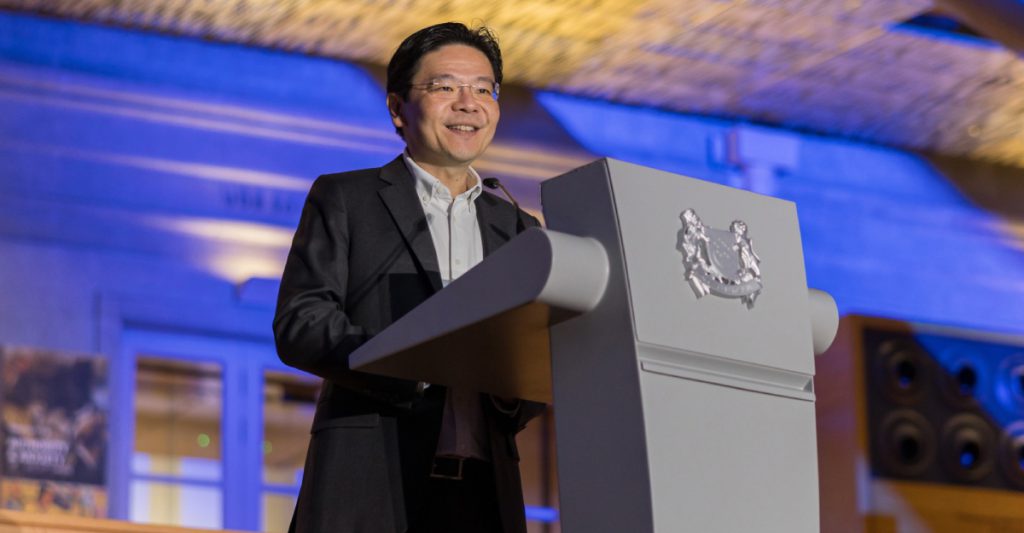Deputy Prime Minister (DPM) Lawrence Wong has unveiled Singapore’s updated National AI Strategy (NAIS) 2.0 at the Singapore Conference on AI yesterday (December 4).
The new strategy, which aims to position the city-state as a world leader in AI, underscores 15 courses of actions that Singapore will undertake over the next three to five years.
These include the launch of AI-specific training programmes and the establishment of a dedicated physical space for AI to “drive innovation and growth through AI”, while “empowering people and businesses to understand and engage with AI”.
Growing Singapore’s AI talent pool and startup ecosystem
The 15 courses of actions — which is the result of consultations with more than 300 local and international experts and organisations — can be categorised under 10 key domains identified by the government: talent, capabilities, placemaking, industry, government, research, compute, data, trusted environment, and leader in thought and action.
These actions will also be continuously reviewed by the government to “respond to fast-moving developments in AI, across various domains”.

To grow and nurture the city-state’s talent pool, the government will be revamping and scaling AI Singapore (AISG)’s AI Apprenticeship Programme, a nine-month programme that grooms AI engineers for industry, and work with industry AI product development teams to expand company attachments.
Recognising that AI will significantly transform various job functions and leave profound impacts on jobs and livelihoods, the government plans to double down on its investment into adult education and training to reskill and upskill workers through the development of sector-specific AI training programmes.
In addition to these efforts, Singapore will also intensify the promotion of AI adoption across all enterprises to drive industry-wide transformation.
Beyond the local talent pool, Singapore aims to attract the world’s top AI creators and more than triple the number of AI practitioners across the city-state to 15,000 over the next three to five years. To nurture this AI community, the city-state is also looking to establish an “iconic AI site” to co-locate these AI creators and practitioners.
Meanwhile, in collaboration with private sector partners, Singapore is looking to strengthen its AI start-up ecosystem by attracting more venture builders and developing more accelerator programmes.
“We want to speed up AI value discovery across industry, and nurture a pipeline of disruptive, AI-native start-ups. These accelerator programmes could be led by a mix of big technology companies and venture capital firms,” said DPM Wong at the launch of NAIS 2.0.
Making Singapore a conducive place for AI value creation

To serve Singapore’s AI ambitions, the government is looking to establish robust infrastructures to make Singapore a more conducive place for AI value creation.
As part of these efforts, the government plans to increase Singapore’s high-performance compute capacity.
The increasing scale and proliferation of AI models have driven exponential growth in demand for chips that can support AI workloads compute. As such, the city-state is looking to deepen its partnerships with chipmakers and cloud service providers.
The government will also ensure sufficient carbon budget is allocated towards data centres, while selectively unlocking more public sector data for AI development that can serve the public good.
Given that there is a range of potential risks around AI, the city-state will take differentiated approaches to managing risks to and from AI. This includes the review and adjustment of appropriate governance and security frameworks for AI systems to address novel risks associated with the tech.
While strict regulations around the use of AI can curb the risks and challenges of AI, regulatory overreach can stifle innovation. As such, Singapore is actively seeking middle ground by encouraging innovation and experimentation while enforcing the necessary guardrails.
Singapore is investing S$70 million to develop SEA’s first regional LLM
In line with NAIS 2.0, Singapore’s Infocomm Media Development Authority (IMDA) is partnering with AISG and the Agency for Science, Technology and Research (A*STAR) to launch a S$70 million initiative — funded by the National Research Foundation — to pioneer the development of a localised large language model (LLM) that can understand and generate human language that incorporates the diverse cultures and languages of Southeast Asia.
The LLM project will build on the early findings of AISG’s Southeast Asian Languages in One Network (Sea-Lion) model, an open source LLM that was trained on 11 languages used in the region, including English, Chinese, Indonesian, Malay, Thai and Vietnamese.
According to a joint statement by the three agencies, this initiative — otherwise known as the National Multimodal LLM Programme (NMLP) — will bridge a gap in the current AI landscape, which is primarily dominated by LLMs originating from Western countries.
The NMLP will be developed and launched over the next two years.
The government has invested over S$500 million in R&D
In 2019, Singapore was one of the first countries in the world to introduce a National AI Strategy. The city-state has embarked on various National AI Projects across various verticals, including education, healthcare, as well as safety and security.
To date, the government has committed more than S$500 million through AISG under the Research, Innovation and Enterprise (RIE) 2020 and 2025 plans.
With recent advances, especially in Generative AI, opening the doors to new possibilities, Singapore aims to “be a place where AI serves as a force for good, and where we harness AI to uplift and empower our people and businesses” through NAIS 2.0.
Singapore believes in the transformative potential of AI. Our second National AI Strategy, or NAIS 2.0, represents Singapore’s commitment to realise the benefits of AI, and to create exciting new opportunities.
– DPM Lawrence Wong
Featured Image Credit: Singapore Conference on AI










